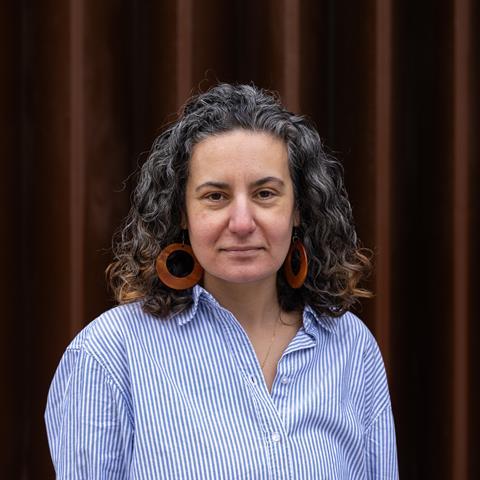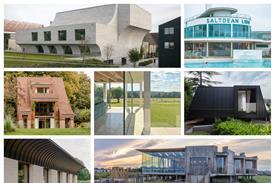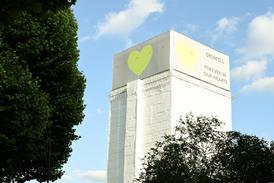As the Women in Architecture Mentoring Programme opens for its next cohort, Eleni Stathi shares how women supporting women is shaping a more inclusive future for the profession

When it was suggested that I write this piece, my instinctive reaction was to doubt whether I had anything interesting to say, or whether my voice was one that should be heard.
It’s a familiar feeling: the quiet, creeping sense of imposter syndrome that so many women in our profession carry, especially when we are invited to speak publicly about something that matters deeply to us. For me, it often comes with a huge sense of responsibility, one that can feel almost paralysing.
When I told a colleague about the suggestion, they smiled and said, “You have loads of opinions. You should absolutely share them.” Their encouragement made me realise how often we need others to remind us that our experiences and perspectives are valuable.
That reminder, the power of being seen and supported, sits at the heart of what the Women in Architecture (WIA) Mentoring Programme is all about. When I was asked to step into leading the programme, I felt the same mix of responsibility and purpose, and above all, I felt privileged to have been asked to lead it.
Building confidence through connection
Last week marked the opening of applications for the 2026 WIA Mentoring Programme. Applications will remain open throughout October, with the new cohort launching in January. This moment has become a highlight of the WIA calendar because mentoring remains our most impactful and transformative initiative.
The programme has been running for several years and has grown into one of the most well-recognised mentoring platforms in the architectural profession. Last year alone, we received over 500 applications, proof of how much this kind of structured, supportive space is needed. The six-month programme offers one-to-one mentoring, networking opportunities and a series of workshops focused on leadership, confidence and career development.
Whether participants are seeking to build leadership skills, navigate career transitions, or return to work after a break, they benefit from a structured framework of support and access to a growing national network of mentors and peers. Many mentees have gone on to take on new roles, move into leadership positions, or even become mentors themselves. Mentors often tell us that the experience reshapes how they lead within their own practices.
We welcome mentors of all genders, and no prior experience is needed. What matters most is openness, empathy and a genuine desire to support others.
A renewed focus
As the programme has grown, and with the newfound purpose that the WIA leadership has brought, so has our ambition. This year, our renewed focus is twofold. First, we want to deepen our understanding of the impact of the mentoring relationships we facilitate. Beyond the immediate benefits of support and connection, we want to capture and learn from the experiences of our participants, understanding the barriers women and other under-represented voices face in practice, leadership and progression, and using that insight to inform WIA campaigns for change across the industry.
Second, we are deliberately seeking to broaden our reach at mid-career and senior levels. These are the moments when many women become less visible, despite holding huge experience and potential. Ageism, the glass ceiling, and the competing pressures of personal and professional life often converge here. It’s also when the gender pay gap tends to widen. Our goal is to bring these women back into the spotlight as both mentors and mentees, and to create intergenerational dialogue that benefits everyone.
Of course, the programme remains open to professionals at every stage of their journey. Its inclusivity across age, background, gender and experience is what makes it so powerful.
More than mentoring
Alongside the mentoring relationships, we run a rich calendar of events designed to inspire and empower. Each year, participants take part in a series of workshops led by the WIA Mentoring Team, which this year has been strengthened by the addition of Natalie Thomson and Tarryn Leeferink, alongside myself. Together, we will lead sessions covering topics such as confidence-building, career development and recruitment, with a dedicated workshop for those returning to work after career breaks.
One of the highlights of the mentoring calendar is our Inspirational Female Leader event, where we hear from women leaders in the industry who have shaped architecture through their creativity, resilience and leadership. These moments of shared reflection and visibility matter, as they show what’s possible to achieve.
Throughout the programme, we also create regular touchpoints for connection and reflection. Many participants tell us that it’s the informal moments – the shared stories, honest conversations and quiet words of reassurance – that stay with them long after the programme ends.
Our vision
For WIA, mentoring represents the best of what our professional community can be: comradeship, allyship and empowerment through collective action.
Having faced moments of self-doubt myself, I know how powerful it is when someone believes in you at exactly the moment you start to question your place. Our vision is for the WIA Mentoring Programme to extend that same sense of belief to others, creating a network where no one feels isolated in their professional journey.
My predecessor used to say that through this programme, we are building a community. I couldn’t agree more. What began in 2022 with just 45 participants has grown every year since, with around 1,000 mentors and mentees taking part over the past four years. What we have built is not just a professional network, but a safe space where women can speak honestly about the realities of their working lives – a space where empathy replaces judgement and encouragement replaces competition.
WIA’s ambition for the programme goes further. The lessons we learn from each year’s cohort about the challenges and barriers they face, bias and resilience, should guide how we, as Women in Architecture, use our collective voice. Beyond mentoring, we want to channel these insights into advocacy and campaigning, highlighting the issues that continue to hold women back and using our platform to push for lasting change across the profession.
A shared responsibility
As we open applications for the 2026 cohort, we invite mentors and mentees alike to join us, and hope that practices and professional bodies will recognise their role in this shared movement. A more inclusive and resilient architectural profession depends on how we nurture and value people at every stage of their careers.
For us, change begins with small acts of courage: speaking up, listening, and reminding one another that our voices matter. True progress rarely happens all at once; it builds through the steady confidence of many of us choosing to be heard.
Read more about the mentoring programme here.
>> Also read: Reimagining architecture: a movement for structural change
>> Also read: More women are becoming architects – but will they stay?
Postscript
Eleni Stathi is an associate partner at HTA Design. She is Women in Architecture UK Mentoring Programme Lead and a member of the RIBA expert advisory group on housing and planning.
















No comments yet